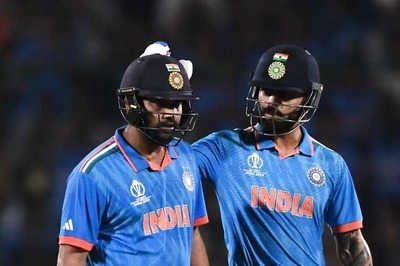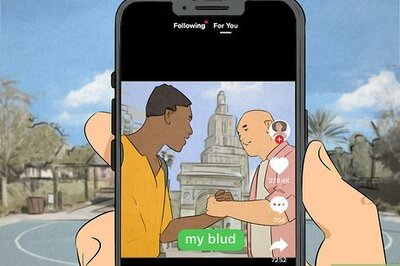
views
THIRUVANANTHAPURAM: A native Nigerian woman going for a walk with her five grandchildren, two of whom are blonde and blue-eyed, one is black-haired but blue-eyed and the rest black-eyed and so on, prompted her English husband to design a T-shirt with the hilarious slogan - ‘Not nanny, but granny’.Nigerian writer Simi Bedford’s laughter, while recalling this amusing incident in her life, echoed all over artist Sajitha Shanker’s house, where we from Express met her. A wonderful sense of humour is what Simi has been blessed with, something that makes her writings thoroughly enjoyable.‘’I like to use humour to get my point across, rather than present issues as if it is coming to you like a lorry,’’ said Simi Bedford, best known for her books ‘Yoruba girl dancing’ and ‘Not with silver’. Simi was in the city to take part in the ongoing Hay Festival.‘’’Yoruba girl dancing’ is semi-autobiographical with the protagonist Remi, as a little girl, having to move out from the familiar Lagos to a shockingly different London. In England, class triumphs over race and it makes a lot of difference whether you are, say an African princess or the daughter of the maid,’’ said Simi, who comes from an aristocratic family in Lagos. Simi’s book has given a different perspective to the readers. ‘’Colonialism was looked at, not like that of a victim, but as more of an immigrant experience. Until then, the point of view had always been from that of the British,’’ said Simi, who instantly gets annoyed at the absolutely false images of slavery portrayed through books and films.‘’They all talk about the Africa in chains, about the poor, child-like, pathetic slaves, who never rose up or never had the capability to rise up. Like they say that history is written by the victors, the books tell you about how plucky these whites were to rule those terrible natives, how they set up the railways and so on, which are all so far removed from reality,’’ said Simi, who was trained to be a lawyer.‘’No one talks of the slave uprisings, the slave rebellions or even the laws framed to keep the blacks down. The only thing that Zulus didn’t have were the guns,’’ emphasised Simi, whose great grand-parents on her father’s side were rescued from a slave ship.The status quo continued until a handful of African writers, African writers in diaspora rather than African writers in Africa, including Simi, decided to take up the pen. Wole Soyinka, a Nigerian writer, poet and playwright, who was awarded the 1986 Nobel Prize in literature and Chinua Achebe, Nigerian novelist best known for his magnum opus ‘Things fall apart’, were some of the first. ‘’For writers from Asia, China and Africa, you have your own language and when you have to live in your country and then write in a different language, you are one space removed. Inevitably, a good part gets lost in translation,’’ said Simi. But for some of the younger African writers in diaspora, like Chimamanda Adichie, whose book ‘Purple Hibiscus’ was short-listed for the Orange Prize for fiction in 2004 and Helen Oyeyemi, winner of the 2010 Somerset Maugham Award, things eased up a little more.Simi is now planning to do a second part to the ‘Yoruba girl dancing’, in the comfort of her study in England. That will be after she finishes shopping for Jaipuri furniture for her daughter Morelle’s handicraft store in Devon, for sale ahead of the Christmas season. Apart from the Hay Festival, Simi had been to Sajitha Shanker’s Gowry Art Institute at Kallar. Ask her about the experience and she would say ‘’...mm...the river by the institute was just fantaaaastic’’.



















Comments
0 comment